#Mayotte Island
Explore tagged Tumblr posts
Text
https://www.reuters.com/world/europe/france-holds-day-mourning-mayotte-island-devastated-by-cyclone-2024-12-23/
0 notes
Text
Reunion or Mayotte? Which One is Better to Visit?
Reunion or Mayotte for visiting? Both French territories are both beautiful destinations located in the Indian Ocean, each with its own unique culture and landscape. Reunion is an island department of France known for its diverse landscapes, including volcanoes, waterfalls, and beaches. Mayotte is an island region of France known for its beautiful beaches and coral reefs, as well as its unique…

View On WordPress
#african#arabic#Beaches in Reunion#Coral reefs in Mayotte#Creole culture#Cultural sites in Reunion#French culture#French islands#Hiking in Reunion#Historical sites in Mayotte#Indian Ocean destinations#Marine reserves in Mayotte#Mayotte Island#reunion island#Snorkeling in Reunion#Volcanoes in Reunion#Waterfalls in Reunion
1 note
·
View note
Text
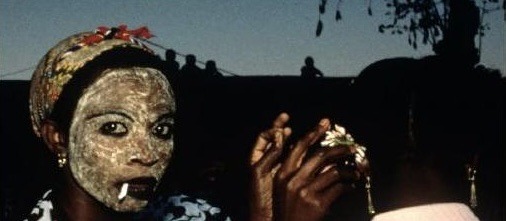
Une île, un monde La Réunion et Mayotte, brève étude sur les cultures musicales de La Réunion & Mayotte/ Océan Indien (PDF)
Concert audio Une île, un monde - La Réunion et Mayotte: Maloya
Granmoun Lélé, Soleye (1991, La Rényon)
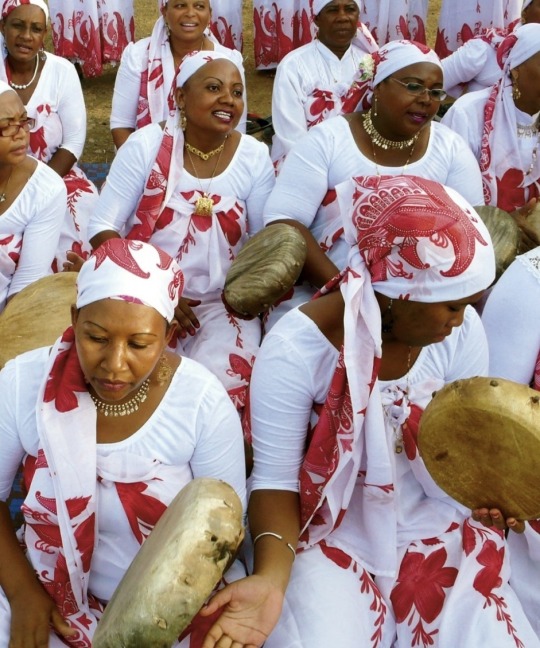
Debaa, Chants des femmes Soufies (Mayotte)
33 notes
·
View notes
Text
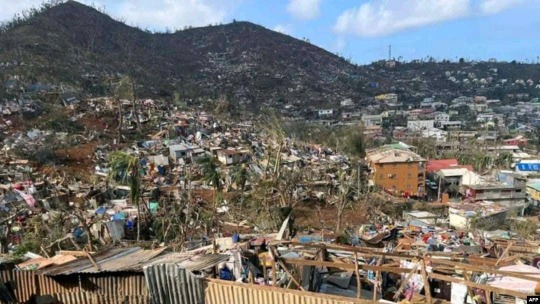
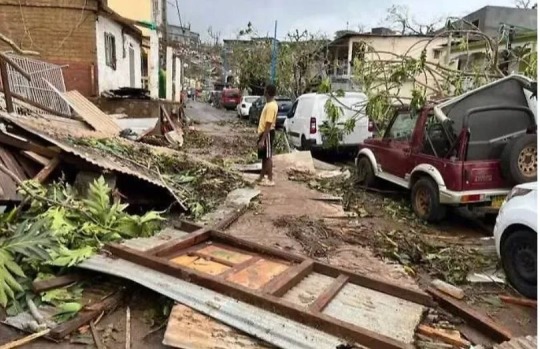
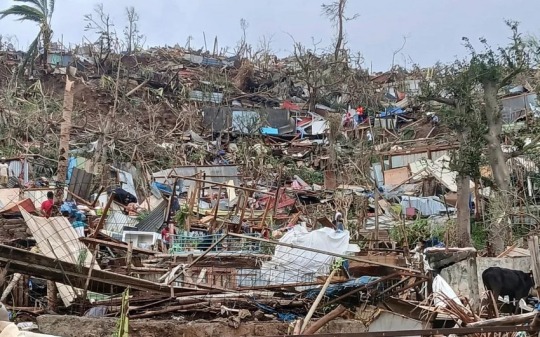
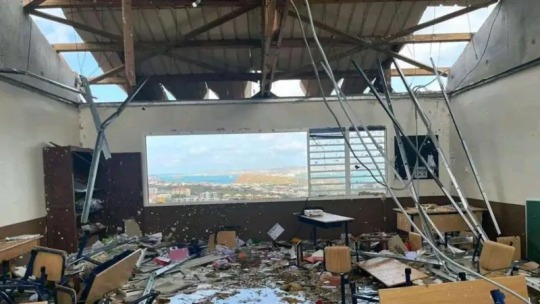
🌪️🇾🇹 Через шторм могло загинути понад 1000 мешканців Майотти.
МЗС Франції поки що не може визначити остаточну кількість жертв циклону "Шидо", адже були зруйновані цілі населені пункти. Майотта — це заморська колонія Франції в Індійському океані між Африкою та островом Мадагаскар. Наразі підтверджено загибель 11 мешканців архіпелагу, але префект департаменту Франсуа-Ксавʼє Бʼєвіль каже, що загинуло дуже багато людей – повідомляє телеканал ”Mayotte La 1ere".
У неділю, 15 грудня, на Майотту прибув перш��й літак з лікарями, ліками та готовою до переливання кров'ю з острова Реюньйон. Цей шторм став найсильнішим за понад 90 років на Коморських островах. Швидкість вітру сягала до 225 км/год.
📸: фото з соцмереж
#екологія#ecology#шторм#циклон Шидо#Майотта#Коморські острови#заморські володіння#Mayotte#Comor Islands#indian ocean#africa#France#cyclone Shido#Африка#Франція
0 notes
Text
#migrants#somalia#mogadishu#migrant smuggling#mayotte#indian ocean#somali beauty salon owner#french island#migrant death#migrant murder
0 notes
Text
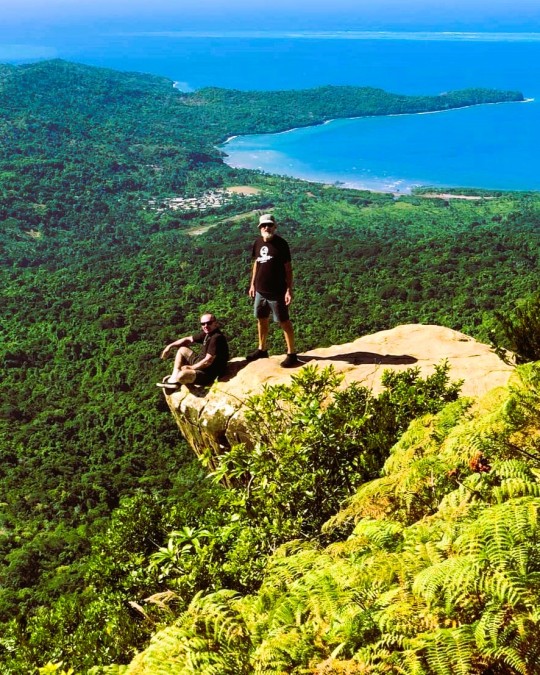
Mont Choungui, Mayotte, France: Mont Choungui is a distinctively conical volcanic mountain in the southern part of the French island of Mayotte, in the Comoro archipelago of the western Indian Ocean. It is the second highest point of the island at 593 m, the highest being Mont Bénara, and is visible from far out at sea. Wikipedia
105 notes
·
View notes
Text
Mayotte doesn’t have any water left.
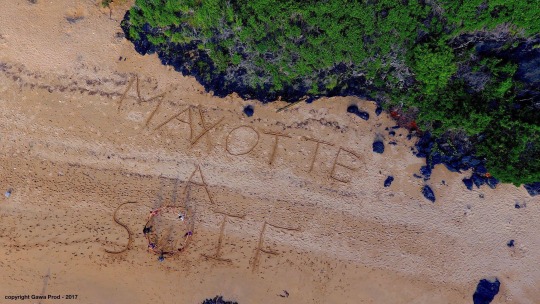
Mayotte is a French overseas territory. Aka a modern colony.
The majority of the (indigenous) population is Black and Muslims and yes it matters to the situation. Mayotte is not like other French overseas territories white people don’t go there on vacation and they don’t move to live there.
It became French in 1841. It used to belong to the Comoros. The indigenous people living in the Comoros and in Mayotte are genetically one and the same. In 1974 France made a referendum asking if they wanted to be independent or not on the 4 islands of the Comoros. The deal was that the votes would be counted TOGETHER. When France counted the vote they realized that the island of Mayotte “wanted to stay French” so they changed the rules and said that the vote was independent for each island and that because of the result in Mayotte a second vote would happen. That’s how Mayotte was officially separated from the Comoros and became a French overseas territory.
The inequalities between mainland France and Mayotte are crazy. In mainland France 15% of the population lives under the poverty threshold. In Mayotte it’s 75%.
Now it’s an island and islands are known to have very limited ressources in water. Except the situation is getting really bad. 30% of the population doesn’t have access to running water all year long they just live in such an extreme poverty they can’t get running water at home. But it reached the point where the 70% of the population who had access to drinkable running water now only have drinkable running water 2 DAYS A WEEK. ONLY 2 DAYS A WEEK.
Their only solution is bottled water. Except it cost twice as much as in mainland France and the stores are running out of bottled water the second they restock.
The administration (white people) is managing this like a bunch of fucking idiots and despite the low reserve they are still letting huge leaks of multiple liters of water happening in desalination factories.
At the same time the one and only natural lake of freshwater is dry.
France is letting it happen because it is not affecting white people. France is responsible they wanted to keep Mayotte for fishing then it’s their fucking job to make it so the population can live with dignity and access to basic needs like water. But they don’t care because the victims are Black and Muslims.
726 notes
·
View notes
Text
In the same weekend, France has demonstrated:
- its inability to have a proper plan for a climate disaster in one of the poorer territory (Mayotte) under its administration- let's call it what it is: a colony-,
- once again, a colonial mindset over another island (Kanaky) by calling white supremacist murders: self-defence,
- and a racist campaign against the new Miss France.
(It's estimated that thousands were killed in Mayotte, probably a lot of undocumented people, because of France unbelievably racist policies in the island)
45 notes
·
View notes
Text
By Linnea Lueken
Media outlets such as Carbon Brief and The Guardian recently ran articles claiming that climate change is making tropical cyclones worse shortly after cyclone Chido caused destruction and tragic loss of life in Mayotte and Mozambique this past December. This is false. Tropical cyclones are not worsening. Data show no increase in the severity or number of hurricanes and typhoons. In fact, recent research suggests that there has actually been a modest decrease in cyclone frequency and power over the past 30 years.
The Carbon Brief post, “Chido hits; Coal’s new peak; Africa’s energy transition,” citing the Associated Press, claimed that Chido was the “most intense storm to hit Mayotte in 90 years,” and that “[s]cientists have long suggested that climate change is making cyclones worse in the region, but a lack of weather data has hindered more conclusive claims.”
The Guardian’s coverage in the article “Hundreds feared dead as Cyclone Chido devastates French island of Mayotte,” rightly focused examined tragedy of the disaster that occurred there, but the paper could not help itself, claiming in the very last paragraph that tropical cyclones are “getting worse because of the climate emergency,” and “cause large humanitarian crises in poor countries in southern Africa, which contribute a tiny amount to global heating, underlining their call for more help from rich nations to deal with the impacts of climate change.”
The Guardian’s point that African nations need more help because of wealthier nations’ alleged larger contributions to “global heating” is silly, because one imagines that aid would be needed and requested by poor countries when natural disasters occur regardless of climate change. They require help because they are underdeveloped, and they are underdeveloped for a variety of reasons, among them poor institutions, limited property rights, and political corruption, none having to do with climate change.
22 notes
·
View notes
Text
President Emmanuel Macron arrived in France’s Indian Ocean archipelago of Mayotte on Thursday after cyclone Chido devastated it last weekend. From when his visit began, the banker-president was faced with angry crowds who booed him as he arrogantly lectured them that they should be proud to be French and called to crack down on Comoran immigrants. As Macron arrived, Réunion1, a public TV station on Réunion island, reported that rescue and health workers in Mayotte believe the cyclone may have killed 60,000 people—nearly a fifth of the registered population. France’s monarchist interior minister, Bruno Retailleau, dismissed the report as a “rumor,” as Réunion1 had pulled it from its web site. But contacted by Libération, Réunion1 journalist Raphaël Kahn defended the now-deleted report, insisting this is what Mayotte rescue workers had said. The cyclone’s 220km/h winds destroyed sheet-metal houses in which much of Mayotte’s population lives, wiping out hillside slums in the capital, Mamoudzou. The French government is hiding the extent of the disaster caused by its decades of neglect of Mayotte’s infrastructure, claiming that it has confirmed 35 dead and 2,500 wounded. The interior ministry admitted, however, that its own estimate “does not match the reality that 100,000 people live in precarious housing.” A further reason that death tolls are flagrant underestimates is that communication between the Small Island, on which Mayotte airport is located, and the rest of Mayotte, particularly the Large Island on which the bulk of the population lives, is very limited. Several barges that used to serve as ferries between Mayotte’s different islands were sunk in the storm. Food and water are only beginning to arrive via airlift to the Small Island. Mayotte’s notoriously poor water system has collapsed, and residents of Mamoudzou’s Kawni slum told Europe1 they are drinking dirty water or not drinking anything at all. Amina, who drank water out of a stream that formed after it rained, said: “We don’t have a choice, we drink this water even though it’s muddy. We do our best to filter it, but anyway if we don’t do that, we die.”
continue reading
25 notes
·
View notes
Text
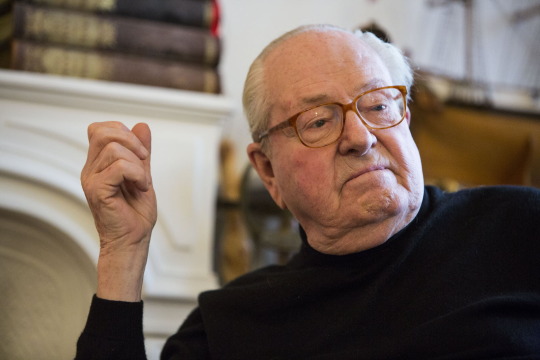
Jean-Marie Le Pen, French far-right leader, dies aged 96
Former paratrooper led National Front party for decades and courted controversy, being repeatedly fined for contesting crimes against humanity
Jean-Marie Le Pen, the founder of France’s far-right National Front party, who sent shock waves through the country when he made it to the second round of the presidential election in 2002, has died aged 96.
The former paratrooper, who led the party from 1972 to 2011, was repeatedly convicted over comments about the Holocaust, which he once dismissed as “merely a detail of history”.
His daughter Marine Le Pen took the party’s leadership in 2011 and expelled him four years later, seeking to distance the movement from his extremist reputation. The party has since been renamed the National Rally (RN).
Le Pen’s family said in a statement that he had been in a care facility for several weeks and he died at midday on Tuesday “surrounded by his loved ones”.
However, it emerged that Marine Le Pen only learned of his death from reporters while flying back from the French Indian Ocean island Mayotte, where she had been visiting victims of Cyclone Chido.
Sophie Dupont, a journalist with BFMTV who was on the plane with Marine Le Pen, said the politician was told when the flight made a technical stop in Nairobi. “Marine Le Pen’s press officer didn’t know. He went to tell her,” Dupont said.
Marine Le Pen’s entourage said she would not make any immediate comment.
The Elysée, in a statement, trod a diplomatic line, summarising Le Pen’s political career: an MP three times, a presidential candidate five times, an MEP seven times, a town councillor and regional councillor. “A historic figure of the far right, he played a role in the public life of our country for nearly 70 years, which is now a matter for history to judge,” it said.
RN said Le Pen had defended “the idea of French greatness with all his soul and at the risk of his own life”.
Last year Le Pen faced charges, along with Marine Le Pen, over allegations they and other party figures had embezzled money from the European parliament with fake jobs. Jean-Marie Le Pen was excused from attending court for health reasons.
Twenty-three years ago he had put the far right at the heart of French politics with his surprise, second-place finish in the first round of the 2002 presidential election. In the run-off he was defeated by Jacques Chirac in a landslide.
Controversies over his statements about race and the Holocaust put him at odds with his daughter’s attempts to sanitise the party and move away from its jackbooted, antisemitic image.
He was convicted and fined several times for contesting crimes against humanity, and in 2014 suggested the Ebola virus could be a solution to the global population explosion. Two years later, he was convicted of “provoking hatred and ethnic discrimination” for telling a public meeting three years earlier that Roma in the city were “rash-inducing” and smelly.
Le Pen was made lifetime honorary president of the FN when his daughter took over as party leader in 2011. She threw him out in 2015 after he refused to temper his incendiary language as she attempted to clean up the FN’s reputation, but only finally succeeded in ejecting him in 2018 after several legal battles.
Jean-Marie Le Pen was born on 20 June 1928, the only child of a Breton fisherer and his wife, a seamstress. In his autobiography, Mémoires: fils de la nation (Son of the Nation), he described his childhood as “modest” in a home with “a dirt floor”. His father died in 1942 when Jean, as he was then, was 14, after a mine caught up in his fishing net exploded.
At 16, Le Pen sought to join the military – specifically the French Interior Forces (FFI) – but was refused as he was too young. Col Henri de la Vaissière reportedly told him: “Think of your mother”. In 1946, he was expelled from his secondary school and moved to the Paris region, where he passed his baccalauréat and began studying law.
He later joined the French Foreign Legion’s parachute regiment and took part in the war in Indochina and in the Algerian war of independence, during which he was accused of torturing detainees.
In 1962, Le Pen told the newspaper Combat: “I’ve nothing to hide. We tortured because it had to be done.” Later, Le Pen denied further accusations of torture in Algeria, claiming they were part of a leftwing “government plot” to discredit him.
He had three daughters with his first wife, Pierrette, of whom Marine was the youngest. He was reported to have been closest to his granddaughter, Marion Maréchal, daughter of Yann Le Pen, his middle child. He married his second wife, Jany, in 1991.
On learning of his death, Jean-Luc Mélenchon, leader of the hard left France Unbowed, wrote on X that he believed in “respect for the dignity of the dead and the grief of their loved ones …” adding “this does not erase the right to judge their actions. Jean-Marie Le Pen’s actions remain intolerable. The battle against the man is over, that against hatred, racism, Islamophobia and antisemitism that he spread continues.”
Daily inspiration. Discover more photos at Just for Books…?
13 notes
·
View notes
Text

THE PRE-ORDER IS HERE!
THE PRE-SALE IS OFFICIALLY CLOSED! THANK YOU VERY MUCH TO ALL!
Depending on the shipping procedure (if it is profitable or not) I will evaluate a second pre-sale!
The complete comic book with 450 pages!
Buy from my website, patreon or kofi!
Due to shipping charges, the comic is $55 dollars.
- Hard cover.
- A5 size (15 x 21 cm)
- Bond paper 80 grs.
- One free sticker.
- Autographed.
Instructions.
The pre-order lasts one month, then the printer will print the books and later I receive them for packing and shipping! Shipments can take about a month, but may take longer due to force majeure.
On the three checkout pages you will be asked for address, not all countries are available, I recommend you to pay from my website with paypal!
There are terms and services in my online store, which talks about refunds and about…
Maximum time to receive a package.
Country not available.
¡Si eres de Chile por favor escríbeme por interno! El precio es distinto debido a que el envío es más barato y el pago es por transferencia :)
The countries I can't ship to are:
Burma, Central african republic , Comoros -, Cuba, CHINA People's Rep., Equatorial Guinea, Maldives, Guinea, Bissau, Iran, Johnston island , Kiribati , Korea north (north korea) , Mayotte island , Myanmar, Nauru , Niue, Russia, Saint pierre et miquelon, Sao tome & principe , Sierra leone, Solomon islands, Somalia, St. Helena (s. Atlantic), St. Kitts and Nevis, St. Lucia, St. Vincent and the Grenadines. Helena (s. Atlantic), Sudan, Syria , Tajikistan , Tokelau islands , Turkmenistan, republic of - tm, Tuvalu, Venezuela, Wake islands and Yemen. Australia, Cocos Island, Equatorial Guinea, Fiji, Maldives, Nicaragua, Haiti, Kiribati, Kuwait, Nauru, New Caledonia, Papua New Guinea, Paraguay, Iraq, Philippines, Solomon Islands, Somalia, Tajikistan, Timor Leste, Tuvalu, Ukraine, Uzbekistan, Vanuatu.
269 notes
·
View notes
Text
Residents of Mayotte have spoken of "apocalyptic scenes" caused by the worst storm in 90 years to hit the French Indian Ocean territory.
Cyclone Chido brought wind speeds of more than 225km/h (140mph), flattening areas where the poorest lived in sheet-metal roof shacks.
"We've had no water for three days now," said one resident of the capital city Mamoudzou. "Some of my neighbours are hungry and thirsty," another one said.
Rescue workers, including reinforcements from France, are combing through the debris searching for survivors. Twenty people have been confirmed dead, but the local prefect said it could be thousands.
Authorities said they were having difficulty establishing the number of deaths due to the large number of undocumented migrants - over 100,000 - in a population of 320,000.
Widespread damage to infrastructure - with downed power lines and impassable roads - is severely hindering emergency operations.
Supplies have begun to arrive, but there are severe shortages of food, water and shelter in certain areas. Some 85% of the territory remains without power, and about 20% of phones appear to be working. Some areas are beginning to get tap water.
But for Amalia Mazon, a 27-year-old midwife from Brussels who has been working at the island's central hospital, access to drinking water and food continues to be a concern.
"The water here is completely yellow. It's unusable for us," Ms Mazon told the BBC.
"We feel completely abandoned, and we don't even know if help is coming. We have no news, we have no idea," the midwife added.
Acting French health minister Geneviève Darrieussecq said the healthcare system in the archipelago had been "degraded" by the cyclone.
France colonised Mayotte in 1841 - and by the turn of the 20th Century added the three main islands that constitute the Comoros archipelago to its overseas territories.
The Comoros voted to become independent in 1974 but Mayotte decided to remain part of France.
The island's population is heavily dependent on French financial aid and has struggled with poverty, unemployment and political instability.
About 75% of the population live below the national poverty line and unemployment hovers at around one in three.
"The images are apocalyptic. It's a disaster, there's nothing left," a nurse working at the main hospital in Mamoudzou told BFM TV.
Mamoudzou resident, John Balloz, said he was surprised he did not die when the cyclone struck.
"Everything is damaged, nearly everything, the water treatment plant, electric pylons, there's a lot to do."
Mohamed Ishmael, who also lives in the capital,told Reuters news agency: "You feel like you are in the aftermath of a nuclear war… I saw an entire neighbourhood disappear."
"It's the hunger that worries me most," Mayotte Senator Salama Ramia told French media. "There are people who have had nothing to eat or drink" since Saturday, she said.
Francois-Xavier Bieuville, the island's prefect, told local media the death toll could rise significantly once the damage was fully assessed. He warned it would "definitely be several hundred" and could reach the thousands.
Mayotte's impoverished communities, including undocumented migrants who have travelled to the French territory in an effort to claim asylum, are thought to have been particularly hard hit due to the vulnerable nature of their housing.
The Muslim tradition of burying the dead within 24 hours also meant documenting the number of those who have perished was more difficult, the prefect said.
In addition to aid, 110 French soldiers have arrived to help with the rescue, with another 160 on the way. Some 800 others from the ranks of volunteers helping during emergencies were also being sent to join local police units.
After arriving in Mayotte, French Interior Minister Bruno Retailleau said "days and days" would be needed to ascertain human losses.
The relief operation is being co-ordinated from Reunion - another French overseas territory.
French Red Cross spokesman Eric Sam Vah told the BBC the situation was "chaotic".
He said the organisation had been able to reach only 20 out of 200 Red Cross volunteers in Mayotte and echoed fears about the overall number of deaths.
"The totality of the slums have been totally destroyed, we haven't received any reports of displaced people, so the reality could be terrible in the coming days," the spokesman told BBC Radio 4's Today programme.
Cyclone Chido also made landfall in Mozambique, where it brought flash flooding, uprooted trees and damaged buildings about 25 miles (40km) south of the northern city of Pemba. Three deaths have been reported.
The cyclone caused structural damage and power outages in the northern coastal provinces of Nampula and Cabo Delgado on Saturday morning, local authorities reported.
Guy Taylor, a spokesperson for aid agency Unicef in Mozambique, said "we were hit very hard in the early hours of this morning".
"Many houses were destroyed or seriously damaged, and healthcare facilities and schools are out of action," he added.
Mr Taylor said Unicef was concerned about "loss of access to critical services", including medical treatment, clean water and sanitation, and also "the spread of diseases like cholera and malaria".
Chido is the latest deadly storm to form of such high intensity.
It strengthened as a result of its long track over the ocean, says Sarah Keith-Lucas from the BBC Weather Centre. The cyclone would have weakened had it made landfall on Madagascar's rugged terrain.
But it is also the case that climate change has an impact - not necessarily in the frequency of storms but in the strength, Keith-Lucas says.
The storm has been now downgraded to a "depression" and is due to cross southern Malawi, then Mozambique's Tete province, before heading towards Zimbabwe overnight into Tuesday.
It may still bring 150-300mm of rain by the end of Tuesday.
4 notes
·
View notes
Text
#migrants#migrant traffickers#migrant boat capsizes#comoros#migrant deaths#migrants killed#french island#mayotte#france
0 notes
Text
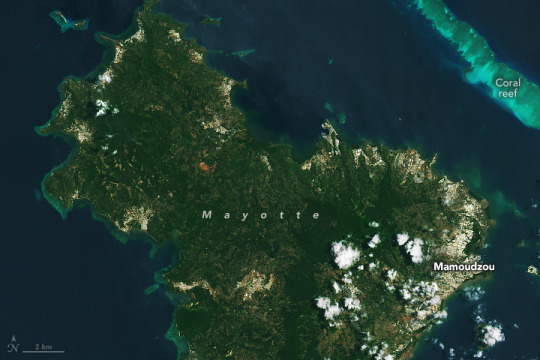
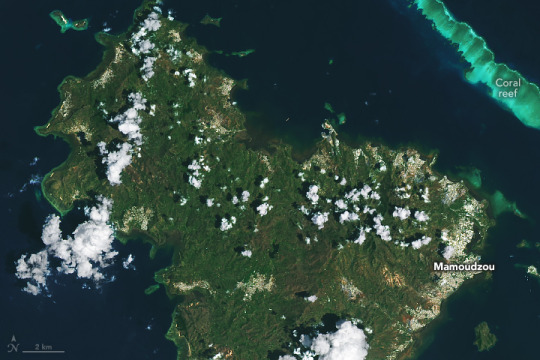
Cyclone-Damaged Mayotte
After hurtling into the islands of Mayotte on December 14, 2024, Cyclone Chido left behind scenes of devastation. Hurricane-force winds tore roofs off homes, downed utility poles, and uprooted trees in the French territory off the southeast coast of Africa. In many areas, the once-vibrant, green landscape had turned brown.
The change is visible in these satellite images of Mayotte’s main island (Grande Terre). The OLI (Operational Land Imager) on Landsat 8 captured the bottom on December 30, two weeks after the Category 4-equivalent cyclone made landfall. The top image shows the same area during more typical conditions two months prior to the storm.
Jess Zimmerman, a professor of ecology at the University of Puerto Rico, has studied how hurricanes in the Atlantic basin change tree composition. But tropical cyclones damage vegetation on landforms in other basins too, including the southwest Indian Ocean, pictured here. After reviewing these images, Zimmerman noted that damage to vegetation was especially noticeable on the hillsides just west of the capital city of Mamoudzou.
High winds blow leaves off trees and snap branches, and heavy rain and wind make it easier for trees to be uprooted from wet soils. Trees at high elevations and on steep slopes are more likely to be damaged in storms because they are more exposed to high wind speeds.
Agence France-Presse reported that during Cyclone Chido, a 300-year-old giant baobab in Mayotte collapsed onto a restaurant, and a 3-meter (10-foot) mound of soil now looms where an acacia tree was uprooted by the storm. Banana trees and other crops were destroyed in the storm, according to a humanitarian assessment, putting the island communities’ food supply at risk.
Chido also damaged infrastructure on the islands, including the airport, hospitals, and roads, disrupting access to electricity, water, and communications. The European Commission’s satellite assessment of cyclone aftermath found much of the damaged and destroyed infrastructure on Grande Terre was in the northeast, where the cyclone made landfall.
NASA Earth Observatory images by Michala Garrison, using Landsat data from the U.S. Geological Survey. Story by Emily Cassidy.
2 notes
·
View notes
Text
2 notes
·
View notes